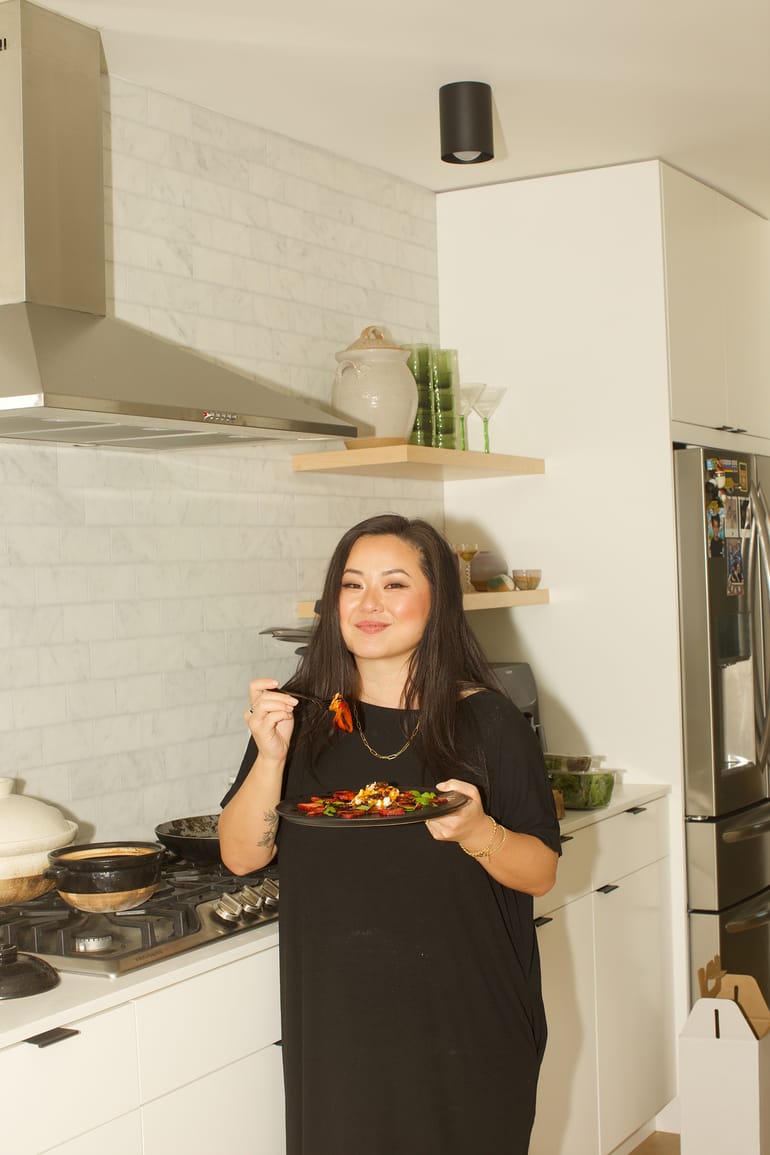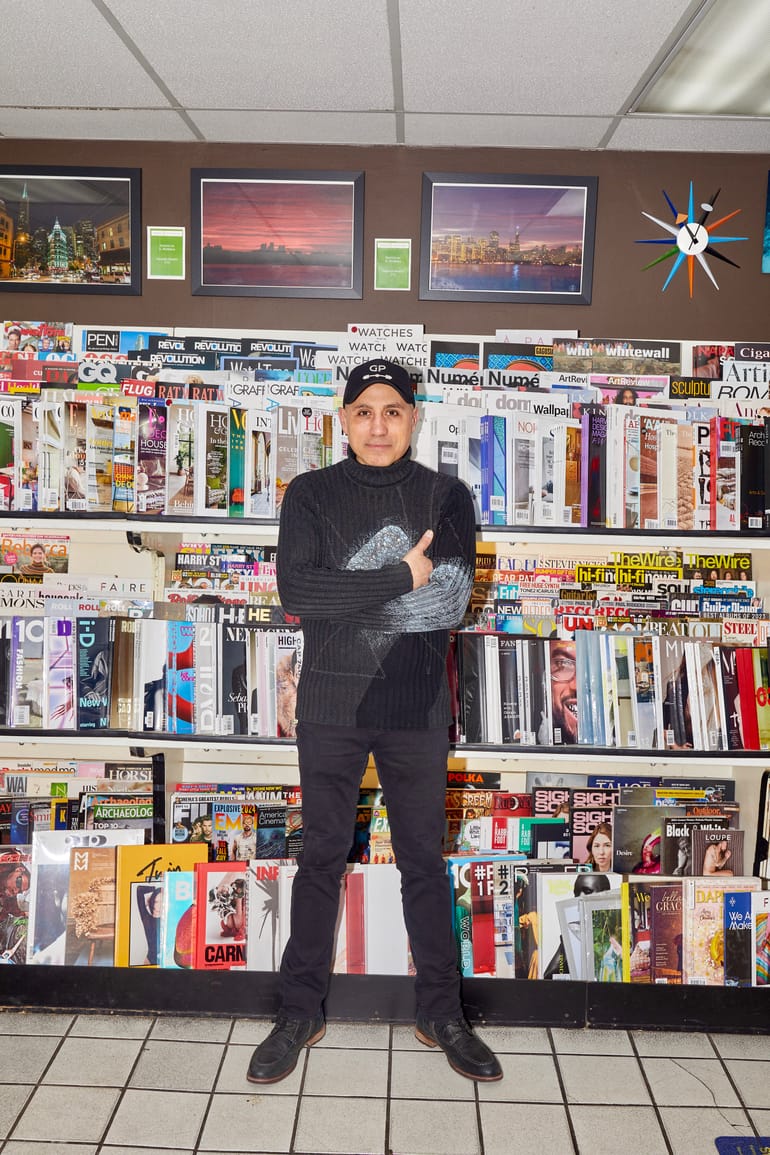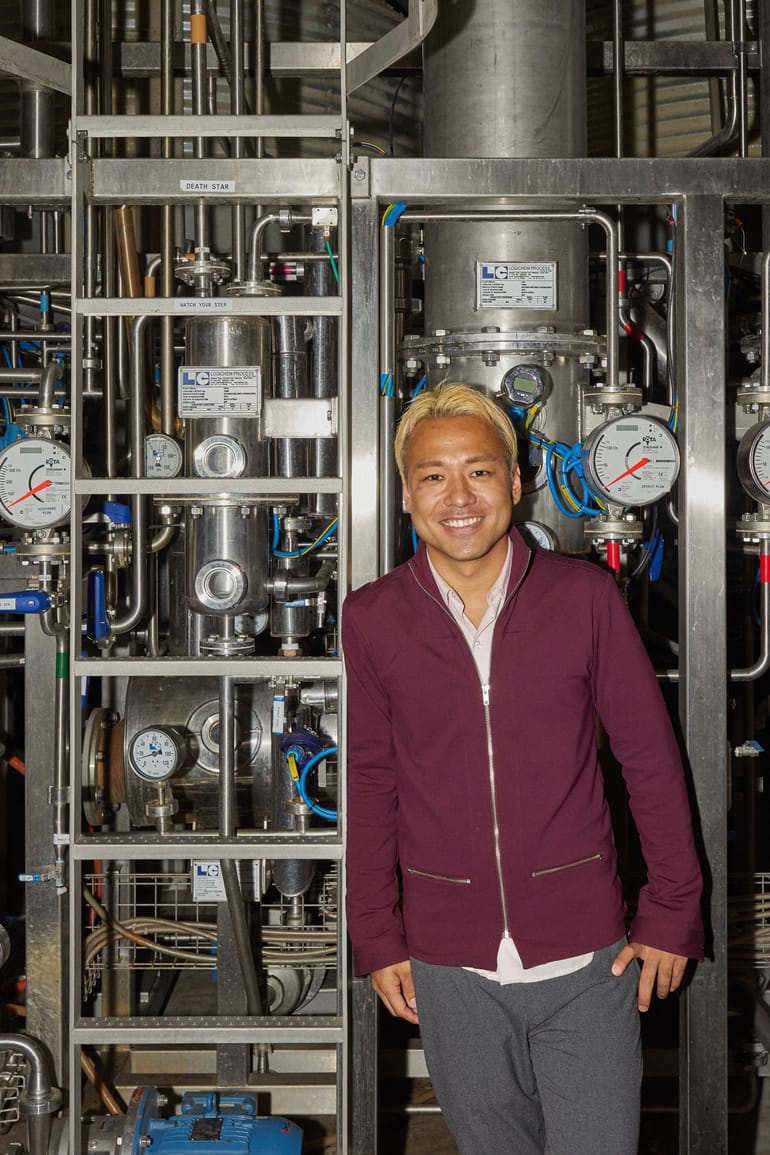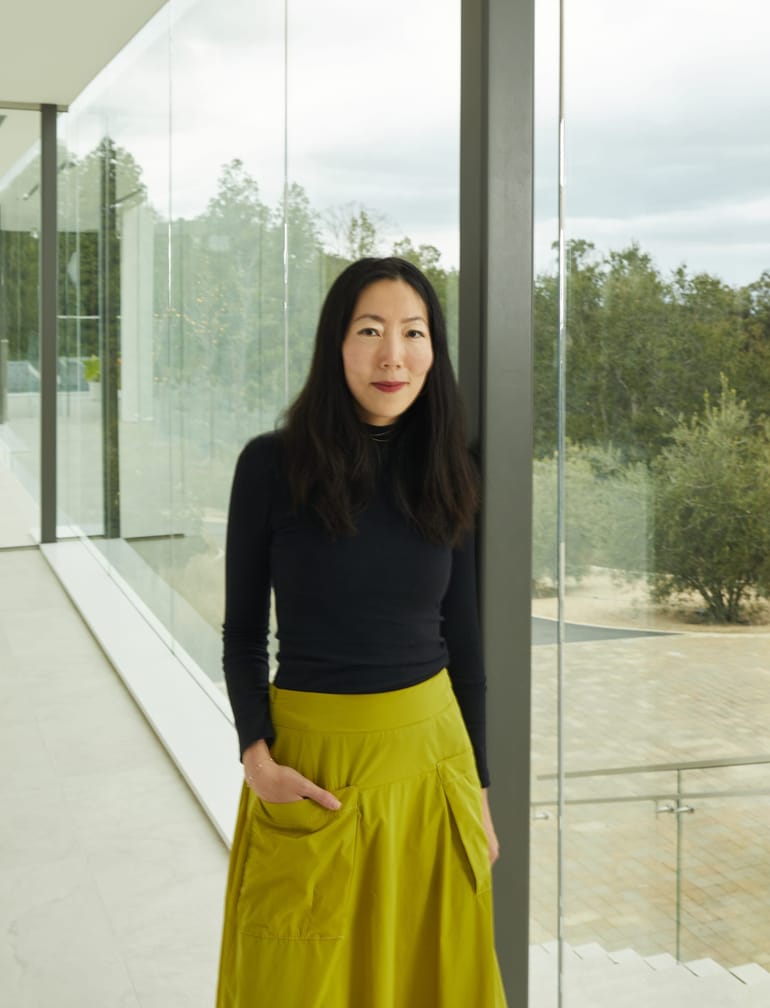On Self-Belief, Suffering, and Conscious Leadership
Jing Gao was born in Chengdu, China and spent parts of her childhood across various European cities before ultimately moving to Canada, where she attended business school. She later moved to Asia to work in the corporate and tech sectors, splitting her time between Singapore and China.
In her twenties, after training with legendary Chengdu chef Yu Bo, she ventured into food, opening an award-winning restaurant chain and hosting a series of global pop-up restaurants.
In 2019, Gao introduced Fly By Jing, a brand inspired by Chengdu's "fly restaurants." The project launched on Kickstarter and was a success, establishing itself as one of the platform's highest funded food companies.
One of the brand's primary offerings is the Sichuan Chili Crisp, composed of 18 premium ingredients sourced from world-class Chinese suppliers. Other products from Fly By Jing include the Zhong Sauce, Mala Spice, and the Fire Hot Pot Base.
Fly By Jing has been featured in prominent publications such as The New York Times, New York Magazine, Forbes, Eater, Saveur, CNN, Fast Company, CBS, Bon Appétit, Food & Wine, VICE, USA Today, and more.
In 2022, the brand secured an additional $12 million in funding, facilitating its expansion into notable retail giants like Kroger and Albertsons. Currently, the brand can be found in over 5,000 retail locations, including Target, Costco, Whole Foods, and more.
On September 26, Jing is releasing a cookbook with Penguin Random House titled "The Book of Sichuan Chili Crisp." The book is a collection of 85 recipes as well as a deep dive into Gao's experiences as a Chinese American entrepreneur. You can pre-order the book here.

Hi Jing.
Hi Helena.
Thank you for being my guinea pig, first-ever-interview for this. I really appreciate it.
Thank you for having me. It's an honor to be your first guest.
For this conversation, I want to focus mostly on where you are now, because in my mind, and I think in other people's minds, you resemble where so many founders dream of being. I think there's this misconception that when you get to a place where you've raised millions of dollars and you're in the magazines and your product is distributed everywhere, that you have everything figured out. And I'd like to demystify that a little bit. How does that sound?
Sounds great, let's go.
How have your views on entrepreneurship evolved since the beginning of your career?
When I was just eight, I found a scrapbook where I wrote about wanting to be a CEO. My understanding of entrepreneurship was vague, obviously. But I wanted it.
Being an immigrant’s child, I was taught to prioritize stability. So I ended up in business school, where you either go into corporate jobs or investment banking. I chose the corporate job. I ended up feeling like a cog in a machine—I knew I needed to get out quickly.
Eventually I took a tech job that took me across Asia. While the perks were appealing—good pay, global travel, and the luxuries of life—I was feeling restless and eager to create something of my own.
I ended up with that opportunity in Shanghai: launching a restaurant. My naiveté led me to partner with the wrong person—someone much more interested in the prestige than the work. The venture, while initially very successful, ultimately ended in a bitter separation.
My experience with the restaurant was a mix of high highs and lowest lows. I dove headfirst into something without really understanding what I was getting into. We were very successful, we won awards. Yet, on a personal level, I learned some hard lessons.
I carried the weight of the restaurant majorly on my shoulders, building approximately 80% of the company myself. But this drive, this need to be a lone soldier, had unintended repercussions. While my commitment laid the foundation for our early success, I was also the face of the restaurant, and getting all of the praise and awards. My partner felt overshadowed. As recognition poured in, he became more resentful. He eventually pushed me out of the business.
This entire journey, especially the strain with my partner, became a pivotal lesson for me. I started to understand the crucial nature of teamwork and collaboration, and how the spotlight's allure could fracture partnerships. These lessons were invaluable, teaching me that doing everything myself works until it doesn’t.
After such a difficult experience with the restaurant, did this make it easier to take the leap with Fly by Jing, knowing you'd already faced a worst-case scenario?
While externally the restaurant might have seemed like a failure, especially through the eyes of people like my parents or their friends, I felt differently. To me, that venture was a success; I knew I played a significant role in its achievements. I took with me valuable learnings, and this affirmation that I could build something successful. This confidence certainly bolstered my drive for Fly by Jing. Moreover, I had read a ton of entrepreneurship books by this point, and I recognized that failure is a part of the process. Being in my late twenties, I felt it was almost a blessing to have faced failure so early on, giving me plenty of time to go build the next thing.

I've always admired your self-belief and conviction, both in your ideas and yourself. Did your previous restaurant experience shape this in any way?
The restaurant's downfall did shake my confidence. There was this feeling that my parents' worst-case predictions came true. When the restaurant failed, I dove right back into the world of food, consulting and aiding others with their projects, but I was indirectly avoiding my own. Everywhere I went, I felt stagnant, like I wasn't truly moving forward. It took a while, but I realized my heart was set on creating what eventually turned into Fly by Jing.
But as I tried to make it happen, I kept getting paralyzed by fear. These fears were multi-faceted, stemming from my immigrant upbringing, the pressure of external validation, and the overwhelming anxiety of public judgment. Insecurities I had wrestled with for a long time.
To regain my confidence, I started to observe successful white men. (laughs) I started reading Tony Robbins. I was so captivated by this question, "How do these confident white men operate? What's their secret?" I wanted to channel that same energy.
Yet, when I started Fly by Jing, that feeling of being an imposter was there. I kept thinking, "Do I really belong here?" But with each bit of positive feedback and love Fly by Jing received, I just kept going.
Then the pandemic came. It brought its own set of challenges but also revelations. I found the space to be introspective, away from judgments and societal expectations. I felt at peace, possibly for the first time ever. This period made me realize how important it was to be genuine and authentic, and to not worry so much about whether I “belong.”
This introspection led to a deep, personal transformation. I not only embraced my identity but also decided that Fly by Jing needed a bolder, clearer brand representation. Our rebrand was an extension of my own journey of self-discovery. Today, Fly by Jing stands tall, showcasing our unique identity, and in the process, encouraging others to find and celebrate their truth.
“When I started Fly by Jing, that feeling of being an imposter was there. I kept thinking, ‘Do I really belong here?’”
I'm fascinated by the notion that a company mirrors its founder. A brand without a clear stance might reflect a founder without a defined viewpoint. The way a company presents itself, even in aesthetic choices, can reveal a lot about a founder's perspective and values. Can you talk about your personal evolution and how it triggered a transformation in your brand?
During that period, I was undergoing a profound spiritual journey, exploring different modalities like plant medicine and holotropic breath work. In one of those breath work sessions, I received a powerful message from my higher self: it was time to reclaim my birth name, Jing. I'd been Jenny for most of my life because my Chinese name made me uncomfortable; it was a source of internal conflict growing up. Slowly, I began to see the parallels: just as I needed to embrace and reclaim my identity without seeking validation, so did the company.
I've seen you address this—the right to exist— in other media, including a New York Times piece about how you handle trolls. You have faced many challenges like this, convincing investors of your brand's value, etc. Has this felt like a fight you’ve always had to fight?
I think that those structures have always existed for people that look like me, right? From a young age, I felt pressure to conform, like changing my name to "Jenny" to fit Western standards. Growing up, I constantly felt the need to adapt to be accepted, and I never truly felt that acceptance. But in 2020, both I and the company decided to embrace our true selves, creating our own reality.
There's a broader shift nowadays where people are re-evaluating ingrained beliefs, either challenging them or starting anew. How did you come to your own personal revelations?
You know, the process was complex. For me, it often felt like I was in a theater, perpetually playing a role for an audience. Reclaiming my birth name was just the tip of the iceberg, the first step on this path of rediscovering my authentic voice. To get there, it meant delving deep, really excavating parts of me that had been buried by societal pressures and my own internal narratives.
One pivotal realization? The extent to which I was driven by performance—not for myself, but for others. I was constantly seeking external validation. It’s like when I'd set out to achieve something, often the underlying motivator was this need for praise, be it from my parents, peers, or the world at large. I'd feel this nagging discomfort, this anxiety when I was fueled by these external drivers.
Take my cookbook, for instance. Launching it, particularly during such a challenging year where I was managing an entire company with close to 20 people reporting directly to me, was hectic. Yet, I pushed myself so hard. It wasn’t healthy.
What drove me? A combination of wanting my name prominently displayed, having the backing of a renowned publisher like Penguin Random House, and a big sign-on bonus. While today I can say I'm proud of the end product, the journey wasn't filled with the joy I'd anticipated. It became clear that my motivations were somewhat skewed.
You know, when I visited and stayed with you during your cookbook photoshoot, you had so much on your plate at that time. I was torn between thinking you might be some sort of superhuman, or perhaps you were just hiding how overwhelmed you were. As impressed as I was, I was also a little worried and hoped you had the right support around you.
Absolutely. Reflecting on that period, it genuinely felt like I was on the brink of physically collapsing before I truly grasped the importance of setting my priorities straight. A pivotal realization was understanding that my actions weren't truly for my benefit, but rather a performance for the approval of others. This subconscious drive, feeling like a circus animal seeking applause, had been with me my whole life. I grappled with feelings of resentment, especially towards my parents, because of this pressure I felt to continuously prove myself; this nagging feeling that I was never truly enough.
I started challenging those motivations, analyzing my reactions to various situations and discerning if they truly lit a spark in me or were just driven by external validation. This introspective journey was a recent one, starting just the previous year. During this time, I stretched myself thin with commitments, from penning the cookbook to opening a new restaurant in LA. I had neglected personal care so much that I gained 40 pounds, lost my passion for cooking, and glued myself to the computer, believing that I had to be present 24/7 for my team on every communication platform.
The culmination of this desperate period was when, by some stroke of luck or perhaps divine intervention, an executive joined our company in a dual role as COO and CFO. With him, there was an almost instantaneous shift in our dynamics. When outsiders looked at our company, they often expressed amazement at how we got to where we were with so little structure. We were on the cusp of reaching $20 million in revenue, yet the internal workings were in utter chaos with everyone reporting directly to me.
But with Matt’s entry, the transformation was evident. He introduced much-needed structure and operational systems, bringing order to our chaos.
“I grappled with feelings of resentment, especially towards my parents, because of this pressure I felt to continuously prove myself; this nagging feeling that I was never truly enough.”
Readers out there might be like—well, duh, of course you hire executives. But I don't think a lot of people understand how difficult that process is at a startup. Number one, they're incredibly expensive, so most companies can’t afford them, and it's also hard to convince an experienced executive to work at an early stage company—even a “cool” one.
Yeah.
Two—if you get it wrong, everything goes wrong. It is such a massive commitment to entrust the operations of your company to someone else. And if you get it wrong, the consequences are just enormous. So, you know, I think it's worth diving in a little bit into how hard it is to get to this place. I'm curious if there were any other reservations or roadblocks that you had.
Absolutely. The weight of not having integrated a structured system earlier bore heavily on me. When you're overseeing 20 people directly, you can't possibly support all their individual needs. This left me grappling with guilt. I constantly felt I wasn't meeting their needs or fostering their growth optimally. In hindsight, bringing in executive support earlier seems like the logical choice, but the reality of a startup often contrasts with the ideal. High-level executives come with substantial costs, and we just weren't in a position to bear that earlier on.
Additionally, there was this lingering self-doubt: why would a top-level executive, seasoned in their field, choose us? I don't think this sentiment is entirely unjustified. Before taking Fly by Jing to its current size, attracting talent with the experience and caliber of my CFO, COO, or even my Chief Commercial Officer, who hails from Sovos brands, would've been a Herculean task. It took significant groundwork to make our brand appealing to such heavy hitters in the industry.
I think that there is a misconception that the entrepreneurial journey is easy if you follow a playbook. You just magically raise a lot of money and then hire all the right people. And then you just get to chill and speak at conferences. I’m yet to find an example of that being true.
At the same time, I do think a lot of our suffering is self-inflicted, right? Like you can learn how to create your own reality, but you don't even know how to do that until you've hit your own limit. Until you’re truly fed up with how things are around you. Then you start learning how to make those changes.
Yeah, that’s a good way of putting it. I absolutely believe that pain is a part of the entrepreneurial journey. If someone's under the impression that it's all smooth sailing, they're either misled or they've been exceptionally fortunate with boundless resources or just sheer luck. But for most of us, 99% I'd say, that's not the narrative. What I grapple with is this ingrained belief that relentless suffering is a necessity. Last year, I often felt trapped in a cycle, thinking that what I was enduring was unavoidable, almost preordained.
However, when I took a step back, especially at the end of last year, and genuinely assessed my role in the challenges, certain decisions stood out. Did I really need to write that book during such a taxing year? Why did I stretch myself that way? I remember being swamped, with my calendar in chaos and no clear strategy guiding my days. It felt as though I was always playing catch-up, unable to even carve out time for simple joys like calling my parents or cooking dinner. That sense of victimhood was pervasive. But hindsight offers clarity. I could have chosen differently. For instance, at the start of the year, I could have streamlined my focus, prioritizing the search for a COO. And on top of everything, I was deep in the process of raising my Series B, which, rather than being efficient, sprawled from February all the way to December. All these commitments, rather than propelling me forward, just spread me thin.
Reflecting on it, I realize that I didn't have to be a victim of my circumstances. The lesson for me is distinguishing between inevitable challenges and the unnecessary suffering we sometimes bring upon ourselves. Challenges are a given. But that victim mindset? We have the power to change that narrative.
“What I grapple with is this ingrained belief that relentless suffering is a necessity.”
I think there's some irony that a lot of us go into founding things because we don't want to work for someone else, yet here we are, letting our circumstances dominate us. It's a difficult but valuable moment when you realize that there is actually no one to blame for this other than yourself. Like… I'm the boss. I've got to figure out why I feel like a victim here. And that’s a journey.
I think many of us have this ingrained notion that suffering and sacrifice are prerequisites for success. And when you asked how I've evolved my beliefs, a significant part of that evolution has been moving beyond this need to constantly perform and instead, learning how to just 'be'. It reminds me of the teachings of Buddha, emphasizing the value of being present. But simply being, can often bring about anxiety. Questions like, "Is this okay? How can I be productive if I'm just existing?" arise. Through spiritual practices, like plant medicine, I've been learning to place my trust in both myself and the universe. It feels as if life events, the lessons we're meant to learn, are somewhat pre-ordained. We might have a sense of free will, but ultimately, the lessons await us. What's crucial is trusting the journey and understanding that things will unfold as they're meant to, regardless of our perceptions of good or bad.
With the business now, it's like a dream come true. We have a smooth-running system, clarity, accountability, a unified vision – it’s everything I hoped for. However, I now grapple with this newfound sense of ease. While it's not exactly 'easy', it's certainly more manageable than my earlier days in the business. And this feeling of ease sometimes makes me anxious. I ponder, "If things are going smoothly, am I losing focus? Does the absence of struggle imply there won't be a reward?" Because I've been conditioned to believe that rewards come after immense suffering.
I certainly wouldn't define your life as easy, as someone watching from the outside. But I can totally relate to the relativity of it, not only your life feeling so much easier, but feeling some sort of panic and guilt and, and like you're not doing enough because you are not suffering relative to how you used to suffer.
Yeah. For so long, I've internalized the belief that rewards are the outcome of enduring pain. However, reflecting on it, I'm convinced that when we operate from a place of fear, such as the fear of failure, we're in a contracted state, which inhibits our true potential. In contrast, when we're in an expanded state, feeling wonder, curiosity, and genuine creativity, we're far more productive. We've all experienced both states at different moments, and I'm aspiring to be in that state of expansion consistently, to be in that flow. The question is, can our most significant achievements come from expansion, or is contraction a necessary precursor?
I won't deny that the fear-driven contraction pushed me to achieve many things. However, it's a double-edged sword. As a leader, the energy I emit resonates throughout the entire organization. I could sense the contraction in others, a reflection of my state. If I firmly believe our best outputs arise from expansion, then this state should be the norm for my entire team. Which means I should be careful not to drive them relentlessly, not to create an environment of job insecurity, and certainly not to equate performance with their value. I realized I had been treating my team similarly to how my parents treated me—this "perform or face consequences" attitude. While it can yield results, it's not the foundation for sustainable growth and well-being.
For sure. It's amazing how much you learn about yourself in this process, like how you end up passing down what was once handed to you.
You can pass it on to your kids, you can pass it on to your team. You know?
Yep.
It’s crazy.
If you could sum up your learnings into one set of advice for founders, what would it be?
As founders, we bring our entire selves to our work, whether we know it or not. The energy we carry, along with all our unreleased emotions, is always present and resonates throughout our organization. It impacts the decisions we make, the culture we foster, and our overall influence in the world. There's a lot of ways to run a business, but in my view, the most significant value creation arises from practicing conscious leadership.
Well, Jing, thank you for being so open. I think there are a lot of people that are going to relate to this in some way.
We need much longer next time. This feels like a Tim Ferriss, like, three-hour-long type thing.
Yeah!
See you then.




